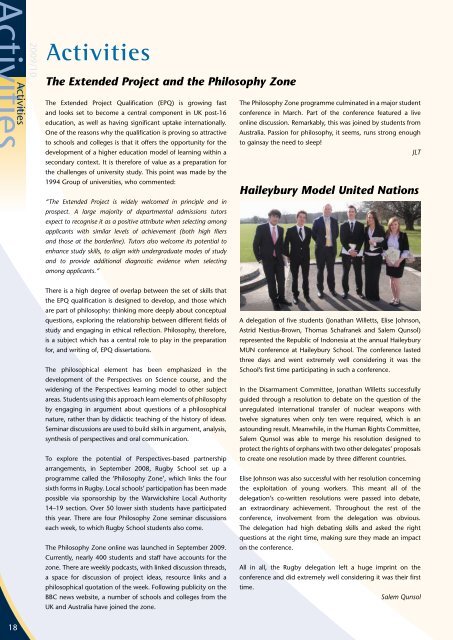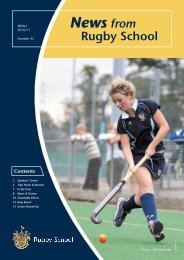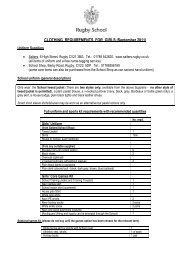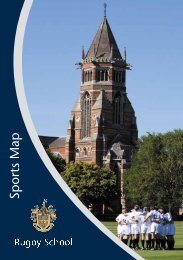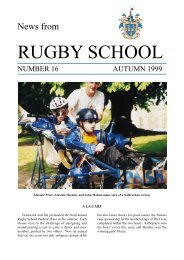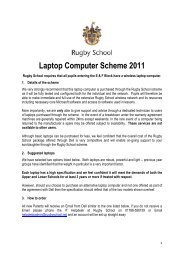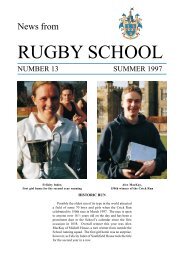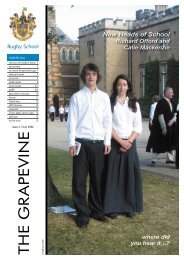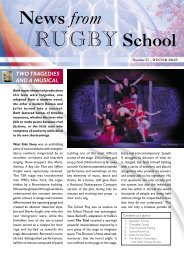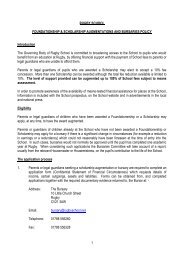Sport - Rugby School
Sport - Rugby School
Sport - Rugby School
You also want an ePaper? Increase the reach of your titles
YUMPU automatically turns print PDFs into web optimized ePapers that Google loves.
Activities<br />
2009/10<br />
Activities<br />
The Extended Project and the Philosophy Zone<br />
The Extended Project Qualification (EPQ) is growing fast<br />
and looks set to become a central component in UK post-16<br />
education, as well as having significant uptake internationally.<br />
One of the reasons why the qualification is proving so attractive<br />
to schools and colleges is that it offers the opportunity for the<br />
development of a higher education model of learning within a<br />
secondary context. It is therefore of value as a preparation for<br />
the challenges of university study. This point was made by the<br />
1994 Group of universities, who commented:<br />
“The Extended Project is widely welcomed in principle and in<br />
prospect. A large majority of departmental admissions tutors<br />
expect to recognise it as a positive attribute when selecting among<br />
applicants with similar levels of achievement (both high fliers<br />
and those at the borderline). Tutors also welcome its potential to<br />
enhance study skills, to align with undergraduate modes of study<br />
and to provide additional diagnostic evidence when selecting<br />
among applicants.”<br />
The Philosophy Zone programme culminated in a major student<br />
conference in March. Part of the conference featured a live<br />
online discussion. Remarkably, this was joined by students from<br />
Australia. Passion for philosophy, it seems, runs strong enough<br />
to gainsay the need to sleep!<br />
JLT<br />
Haileybury Model United Nations<br />
There is a high degree of overlap between the set of skills that<br />
the EPQ qualification is designed to develop, and those which<br />
are part of philosophy: thinking more deeply about conceptual<br />
questions, exploring the relationship between different fields of<br />
study and engaging in ethical reflection. Philosophy, therefore,<br />
is a subject which has a central role to play in the preparation<br />
for, and writing of, EPQ dissertations.<br />
The philosophical element has been emphasized in the<br />
development of the Perspectives on Science course, and the<br />
widening of the Perspectives learning model to other subject<br />
areas. Students using this approach learn elements of philosophy<br />
by engaging in argument about questions of a philosophical<br />
nature, rather than by didactic teaching of the history of ideas.<br />
Seminar discussions are used to build skills in argument, analysis,<br />
synthesis of perspectives and oral communication.<br />
To explore the potential of Perspectives-based partnership<br />
arrangements, in September 2008, <strong>Rugby</strong> <strong>School</strong> set up a<br />
programme called the ‘Philosophy Zone’, which links the four<br />
sixth forms in <strong>Rugby</strong>. Local schools’ participation has been made<br />
possible via sponsorship by the Warwickshire Local Authority<br />
14–19 section. Over 50 lower sixth students have participated<br />
this year. There are four Philosophy Zone seminar discussions<br />
each week, to which <strong>Rugby</strong> <strong>School</strong> students also come.<br />
The Philosophy Zone online was launched in September 2009.<br />
Currently, nearly 400 students and staff have accounts for the<br />
zone. There are weekly podcasts, with linked discussion threads,<br />
a space for discussion of project ideas, resource links and a<br />
philosophical quotation of the week. Following publicity on the<br />
BBC news website, a number of schools and colleges from the<br />
UK and Australia have joined the zone.<br />
A delegation of five students (Jonathan Willetts, Elise Johnson,<br />
Astrid Nestius-Brown, Thomas Schafranek and Salem Qunsol)<br />
represented the Republic of Indonesia at the annual Haileybury<br />
MUN conference at Haileybury <strong>School</strong>. The conference lasted<br />
three days and went extremely well considering it was the<br />
<strong>School</strong>’s first time participating in such a conference.<br />
In the Disarmament Committee, Jonathan Willetts successfully<br />
guided through a resolution to debate on the question of the<br />
unregulated international transfer of nuclear weapons with<br />
twelve signatures when only ten were required, which is an<br />
astounding result. Meanwhile, in the Human Rights Committee,<br />
Salem Qunsol was able to merge his resolution designed to<br />
protect the rights of orphans with two other delegates’ proposals<br />
to create one resolution made by three different countries.<br />
Elise Johnson was also successful with her resolution concerning<br />
the exploitation of young workers. This meant all of the<br />
delegation’s co-written resolutions were passed into debate,<br />
an extraordinary achievement. Throughout the rest of the<br />
conference, involvement from the delegation was obvious.<br />
The delegation had high debating skills and asked the right<br />
questions at the right time, making sure they made an impact<br />
on the conference.<br />
All in all, the <strong>Rugby</strong> delegation left a huge imprint on the<br />
conference and did extremely well considering it was their first<br />
time.<br />
Salem Qunsol<br />
18


